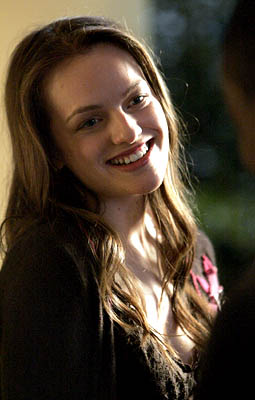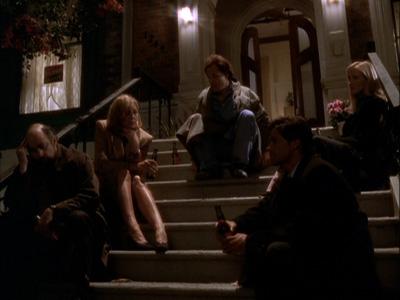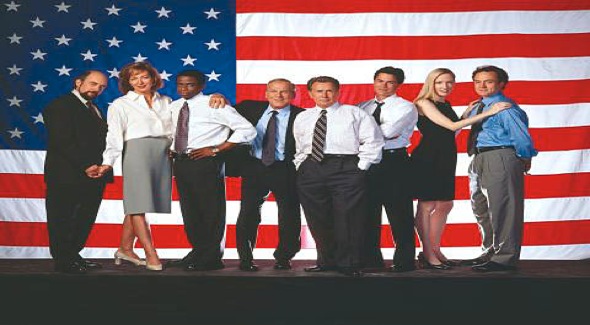Perich’s analysis and review of The West Wing Season 2 continues with Episodes 3 through 5: “The Midterms,” “In This White House” and “And It’s Surely to Their Credit.”
THE MIDTERMS
While Josh recovers from surgery, the staff launches support for midterm Congressional races. Charlie gets distant with Zoey, Toby obsesses over the extremists responsible for the attack, Bartlet obsesses over a former rival, and Sam urges a friend to run for office.
From the standpoint of craft, I admire the use of the midterm races as a narrative device to speed up time and get Josh back on his feet. It’s eminently plausible that the White House would spend twelve weeks in crisis mode, defending incumbents and boosting challengers. This keeps the audience from having to jump back and forth between Josh’s bedside and the Oval Office, which is fortunate.
I also admire how Sorkin tells the story of Charlie shying away from Zoey almost entirely off-camera. When I saw how that arc began, I grew dangerously bored. There are few tropes more rusted than a hero choosing to keep his love at bay because of (bitter sigh) his enemies. Thankfully, not only is it resolved within an episode, it’s resolved almost entirely off-camera! Zoey passes through rooms, looking for Charlie but not finding him, and at one point even addresses a question to Leo, off-screen, while another scene is starting. We forget all about it until the happy ending, where they make out on the White House porch.
(Since these are the first episodes of The West Wing I’ve seen, I never realized how much of a coup it was when Matthew Weiner landed Elizabeth Moss for Mad Men. She’s a gem of an actor)

Speaking of anticipating my objections, the plotline with Sam recruiting his college buddy to run for office is a refreshing change from last week’s idealism. Sam brings Tom and his wife Sarah to the White House, pitching them on a golden opportunity: the chance to run for Congress with the President’s endorsement. Given Bartlet’s record approval ratings, it seems like a sure thing.
Except, of course, it isn’t: a few sticky details in Tom’s past prevent the President from endorsing him, which costs him the race. The scene where Leo breaks the news to Sam hurts, especially because of its inevitability. Sam made the promise to Tom in good faith, but can’t back it up. It’s not a case of him choosing between his friends and the White House – he can’t choose. It has to play out the way it does, in disappointment. Serving the interests of an institution forces you to make shitty calls sometimes.
That said, while I love the direction I have a hard time with the tone. I’m glad they didn’t make Tom an overt racist, instead sprinkling his past with spinnable elements – a preference for white juries, membership in an all-white fraternity. This is good, because we shouldn’t be supporting Sam for casting aside his racist chum; we should be sympathizing with him for letting a friend down. And yet – jury selection? an old fraternity? These are the elements that cost a candidate the Presidential seal of approval? Did Sorkin actually know who was in Congress at the time of writing?
Also, while the scene where Tom and Sarah confront Sam in his office is great, Sarah unloads an awful lot of venom. This over a Congressional run that wasn’t even a dream of theirs three months earlier. I have several friends who’ve made failed Congressional bids, and they all have successful careers, happy marriages and the support of their friends.
But, of course, the point of the scene isn’t to be realistic but to forebode. Something tells me that this is going to come back to haunt Sam, perhaps the thunder pounding outside and the dark-eyed woman snarling, “If we ever get a chance to screw you in the future …” Is this what passes for foreshadowing in Sorkin’s writing? Was the gun that Josh got shot with stolen from above his fireplace in S1, perhaps?

I find Toby’s concerns about the legality of his proposed witch-hunt even more quaint than Leo’s concerns about Tom. What would an 18-year-old watching this show for the first time – someone whose political consciousness was formed during the War on Terror – think of this story arc? There might be a statute that prevents the FBI from going after people tangentially connected with an extremist group? Cheap shots at the [last / current / next] administration aside, this was old news even when The West Wing was being written. The Clinton Administration had no problem going after domestic terrorists (of which there were a few in that time), or using tools like extraordinary rendition.
I can’t swallow that someone who researched the details of the White House as meticulously as Sorkin did could be so wrong on the tone of its staff. But of course, Sorkin isn’t wrong, because he’s not telling a story about real White House staffers. He’s telling a story about conflicted, passionate heroes who happen to work in the White House. Sorkin’s protagonists are always deeply passionate people, whether they’re working in sports broadcasting (SportsNight), sketch comedy (Studio 60 …) or social media (The Social Network). Sorkin’s acknowledged embellishments in the story of the founding of Facebook don’t make The Social Network a less compelling story and, I suppose, neither do Sorkin’s embellishments of how Democrats act when they have power.
This is also the episode where Bartlet goes off on a rant to a Dr. Laura stand-in. I mention it now but I’m going to talk about it later, because it ties in better with “And It’s Surely to Their Credit.” But here it is, since I know you love it so:
The episode ends with the staff sitting on Josh’s stoop, passing a bottle of wine and saying, “God bless America.” And they mean it, too. I would have written it off as cheap fluff were it not for my girlfriend sitting next to me, who observed (unprompted) that that’s the sort of thing White House staffers probably say. And while I’m not sure I agree with that, it’s definitely the sort of thing we might hope White House staffers would say (especially if it’s an administration we like). And to take it one further, it’s the sort of thing a White House staffer might say, not out of deep sincerity but out of a conscious imitation of what they imagine a White House staffer is supposed to say. We are all conscious of the roles we’re expected to play to varying degrees, and sometimes we make choices based on the role rather than our desires. I imagine you can’t get to the White House, the most powerful office in the history of the human species, without being very conscious of the meaning of roles and images.
Sitting around with your coworkers and saying, “God bless America” with throaty solemnity is simultaneously unrealistic and very likely to happen. That’s the sort of weird pageantry that the White House and The West Wing demand of us.

Man, season 2 of Cowboy Bebop sure seems different. I guess I’ll have to watch the show sometime to understand how it made the transition.
This comment isn’t Sorkin enough. Needs more Sorkin.
In reference to the heavy-handed foreshadowing of “count on getting screwed,” The West Wing as a series includes many similar instances of what seems like heavy handed foreshadowing that goes nowhere. Characters express intentions and don’t follow through on them. Ideas that seem important are dropped.
I don’t want to spoil Season 2 and what comes after, so I’ll use an example from the first season. They had a media consultant named Mandy who was something of a B-string character. Around, but not core cast. She and Josh had some history, and in one episode he sent her to Toby to ask about importing a panda from China for an American zoo. Toby explains that Josh did this to embarrass her (somehow), and Mandy asks Toby to help her humiliate Josh. He appears to consider.
And then that’s over. Not only does the panda/Josh/pride/whatever thing never come up again, Mandy never comes up again. She’s just gone. Her character wasn’t really working, so it made sense to drop her. But they did it mid storyline without explanation, and they do it often enough that it became known as sending characters to “Mandyville.”
Certainly, there’s an argument to be made here that this is weak, or at least scattered, writing. But I like it. The White House is the kind of place where people come and go regularly, so a staff member moving on in between episodes doesn’t warrant much discussion. People may *want* to do something, but they may also realize they don’t have the influence/votes/support to actually do it. On The West Wing, individuals and their very clearly expressed intentions are often frustrated. But Sorkin foreshadows their success, not their surrenders.
I also liked this aspect of the show (foreshadowing a plot line that never developed on screen) because it gave the feeling that there was a lot more going on in the White House than just what we saw. As (I assume) with the real White House, there may be hundreds of things going on in a given week — from mundane office pranks to crisis-level emergencies — and no one person (or viewer) could be expected to know the intimate details of all of them.
So The West Wing shows us events from across the spectrum, but it doesn’t even pretend to follow all of them because it can’t, because there’s too much going on. That idea, that the characters always have much more to get done than we see them do, justifies and explains the show’s fast pace (would they have a need to walk-and-talk if they only did what we saw on screen?), the ensemble cast, and dramatic slow downs (if the characters think that a topic is worth sitting down for, then it must be important).
You could argue this is over-the-top and that the viewer could be trusted to assume that work gets done off-camera, but the West Wing didn’t require the viewer to assume that, it showed it happening with the dropped threads. It was just another element that supported the show’s verisimilitude. (And, from a dramatic perspective, it helped alleviate expectations created by a Chekhov’s Gun. If you didn’t know what was going to be dropped, it was tough to guess which issue would rise to become the next crisis–putting the viewer in similar shoes to the characters, who also don’t often know what’s coming next.)
It’s not that Tom lost the election that upsets him and his wife, it’s that he lost the election because the White House has tacitly condemned him as a racist. That’s the kind of stain that doesn’t wash out, especially for a Democrat.
For that matter, I’m not surprised the Bartlett White House was cautious about endorsing him, even though his past is only mildly controversial: they don’t have any black senior staff, their party is vulnerable in Congress, and there’s several points during the course of the show (I think at least once in S1) where they find themselves at odds with the black caucus. They can’t afford a whiff of racial insensitivity.
I didn’t see her warning as foreshadowing, just as an epitaph to this friendship Sam had: it’s over. They hate him now.
That’s the kind of stain that doesn’t wash out, especially for a Democrat.
Do you mean “a Democrat,” as in a member of the fictional Democratic party that exists in this television show? Or do you mean as in actual Democrats in actual Congress? Because overt racism has never been a bar, depending on what district you come from.
they don’t have any black senior staff, their party is vulnerable in Congress, and there’s several points during the course of the show (I think at least once in S1) where they find themselves at odds with the black caucus.
This is interesting to know. Thanks!
In that group photo, what’s that white stuff, paint maybe, spattered all over Danny Tripp’s legs? That’s weird.
That would be a rim light. It’s also visible on the backs of Dana Chase’s calves, only less so, because it’s at a different angle.
Also of possible interest, a recent post on the liberal site ThinkProgress argues that Bartlet wasn’t a very good president. It drew a sharp response from Bartlet himself (or, at least his Facebook alter ego).
**Warning: Spoilers for Seasons 1 through 5**
http://thinkprogress.org/alyssa/2012/02/14/423446/josiah-bartlet-was-a-mediocre-president